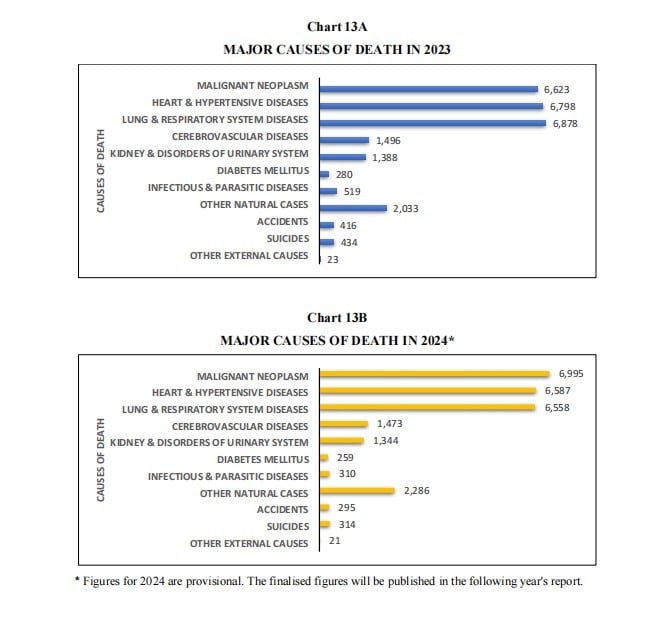SINGAPORE: SG Mental Health Matters, the community group behind Project Hayat, has launched a landmark study to estimate the true number of suicides in Singapore.
The announcement was made on 10 Sept 2025, coinciding with World Suicide Prevention Day.
This new effort builds on Project Hayat’s White Paper released the same day in 2024, which had called for a comprehensive national suicide prevention strategy anchored in the evidence-based S.A.V.E L.I.V.E.S. framework.
Shock over revised 2023 suicide statistics
The launch follows widespread concern sparked in July 2025, when provisional statistics suggested suicides in 2023 had reached a 20-year low.
However, finalised figures revealed 434 suicide deaths in 2023—34.8 per cent higher than the earlier estimate of 322 deaths.
According to the Immigration and Checkpoints Authority (ICA), this marked a sharp revision that raised questions over the reliability of provisional data.
By contrast, provisional data for 2024 reported 314 suicides, a figure slightly lower than the provisional 2023 estimate but still troubling given the later adjustments.

“We cannot build solutions on incomplete data”
“Every life lost to suicide is one too many – but we may be undercounting these lives,” said Anthea Ong, former Nominated Member of Parliament, who initiated Project Hayat and co-leads the effort.
“Last year, we called for Singapore to SAVE LIVES through a national suicide prevention strategy. ”
“This year, we are pushing forward by finding better ways to measure the true scale of the crisis. We cannot build solutions on incomplete data.”
New statistical approach to estimate hidden figures
The study will be led by Dr Rayner Tan, Assistant Professor at the NUS Saw Swee Hock School of Public Health.
It will employ the Network Scale-Up Method (NSUM), a statistical technique never before applied to suicides in Singapore.
NSUM has been used internationally to estimate the size of hidden populations, such as communities at risk of HIV, which are not always captured by official surveys or censuses.
“Applying this method to suicides is an important step forward,” Dr Tan explained.
“We welcome further funding support and hope this study will give us a clearer picture of the lives we are losing and guide evidence-based prevention policies that match the scale of the problem.”
Suicide remains leading cause of youth deaths
Suicide has remained the leading cause of death among young people aged 10 to 29 in Singapore for six consecutive years, according to ICA data.
Men accounted for nearly 70 per cent of all suicide deaths in 2023, with both youth and elderly men facing alarming increases.
Certain subpopulations, such as Indian men, have been disproportionately affected, underscoring the influence of ethnicity, socioeconomic status, and wider social determinants on suicide risk.
“Without urgent intervention, Singapore risks losing even more men to suicide—across both our youngest and oldest generations,” Ong added.
Focus on male suicide risk and social conditions
To address these vulnerabilities, SG Mental Health Matters and the NUS Saw Swee Hock School of Public Health have submitted a S$1 million grant proposal to the Social Science & Humanities Research Thematic Grant.
If approved, the funding will support a community-based study of male suicide risk, designed to investigate the social conditions that drive despair.
“Suicide is never just about an individual—it is about the social conditions that make people feel hopeless,” Ong said.
“By focusing on male suicide, we aim to uncover those conditions and design prevention that truly meets men where they are.”
Project Hayat’s growing impact
Since its launch in 2024, Project Hayat has made notable progress in advancing conversations on suicide prevention.
Its findings have been presented at the NUS Social Service Research Seminar Series and at the International Association for Suicide Prevention Congress 2025 in Vienna.
In 2024, Project Hayat’s research subgroup secured a S$50,000 seed grant from the National University Health System under the Academic Health Programme Fund.
This grant is currently supporting interviews with five vulnerable groups: older adults, LGBTQ+ people, low-income migrant workers, neurodivergent youth, and caregivers. A community report is expected in early 2026.
Research pipeline and publications ahead
Project Hayat is preparing scientific papers on its unique community-led governance structure, its shift away from a moral framing of suicide, and the constructive role of media in prevention.
These are expected to be published by the end of 2025.
“Project Hayat remains committed to ensuring that every life counts, and that Singapore’s national suicide prevention efforts are anchored in transparency, compassion, and evidence,” said Dr Tan.
If you or someone you know is struggling with thoughts of suicide, please seek help immediately. In Singapore, you can contact the Samaritans of Singapore (SOS) at 1-767 or text 9151 1767 for support. You’re not alone, and help is available.
The post Community group launches study to uncover true suicide numbers after Singapore’s first prevention White Paper appeared first on The Online Citizen.


